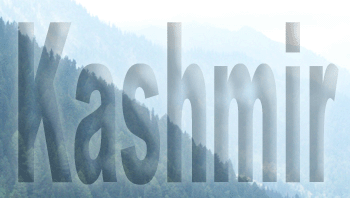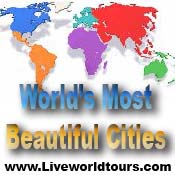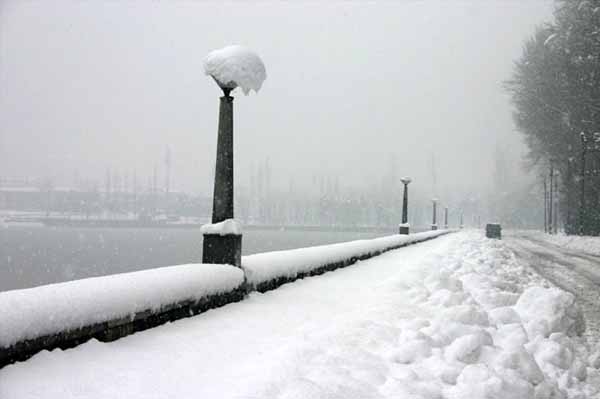 |

Multi Dimensional Entertainment magazine from INDIA |

click for Other Tourist Place |
 |

Multi Dimensional Entertainment magazine from INDIA |

click for Other Tourist Place |
 |
|
|
|
|
|
|
|
|
|
 |
| Travel Tips
to Kashmir - Srinagar
Best Season : March to
October
Winter- from December to the beginning of March is winter time, which presents Srinagar in yet another mood. Bare, snow-covered landscapes being watched from beside the warmth of a fire is a joy that cannot be described to anyone who has not experienced it. Some houseboats and hotels remain open in winter-these are either centrally heated or heated with ‘bukharis’, a typically Kashmiri stove kept alight with embers of wood, quite effective in the winter. Rich and redolent with the flavour of the spices used –cinnamon, cardamom, cloves, saffron, etc. -- Kashmiri food can be the simple meal of a family, or a 36-course wedding banquet called Wazawan. The staple diet of every Kashmiri is rice, the most preferred being the dense, slightly sticky grained Kashmir variety, which is prized in the Valley. Mutton, chicken or fish are of prime importance in Kashmiri meal and everyday cooking often combines vegetable and meat in the same dish. Mutton and turnips, chicken and spinach, fish and lotus root are also very popular combinations. Pure vegetarian dishes include dum-aloo - roasted potatoes in curd-based gravy, and chaman- fried paneer (cottage cheese), in a thick sauce. Non-vegetarian dishes are considered in Kashmir to be a sign of lavish hospitality and at a Wazwan or banquet, not more than one or two vegetarian dishes are served. Sweets do not play an important role in Kashmiri cuisine. Instead Kahva or green tea is used to wash down a meal. Several restaurants in Srinagar serve Kashmiri wazawan on their menus. Mughal Durabar, Ahdoos and Grand, on the Residency Road, offer authentic wazawan. Similarly, Broadway Hotel on Maulana Azad Road arranges wazawan prepared by professionals.  Travelling in Srinagar and in Kashmir can be an experience of a lifetime. Do keep the following in mind to have a pleasant stay while you are there. Kashmir has been a hotbed of political unrest in the 80's and early 90's. Though it is now considered safe and has opened up to tourists, it is best to check the latest situation before your travel there. Also do take care when you are there not to travel/drive alone outside of the city and always carry identification proof. Also check with the tourism centre/ your hotel for reliable guides and engage authorised personnel only. The Tourist Reception Centre (TRC), Srinagar is a unique, all-inclusive service, providing various tourist facilities within one complex - making it the perfect place for tourists seeking any information/help. Besides housing the offices of the State Department of Tourism and those of the J&K Tourism Development Corporation (J&K TDC), it has information counters on almost every activity connected with tourism. The airport is about 14 kms from the city. The taxi ride from the airport to the Tourist Reception Centre costs about Rs.250. Jammu & Kashmir State Road Transport Corporation (J&KSRTC) also operates special coach services between the airport and the city. Srinagar has temperate climate through most of the year and winters are cold with regular snowfall. Though cottons are alright for summer days, carry something warm for the evenings and nights. If you are travelling during winter or plan to travel to the hills beyond carry adequate woollens. While in the city it is advisable for women to dress modestly. If you want to visit mosques and holy places be prepared - wear clothing that covers your legs completely and carry a scarf for covering your head. You will also have to remove your footwear before entering any religious place. Drink bottled or mineral water only as water related diseases may be acquired through unhygienic intake of water or food. Do not encourage beggars. Be careful of small time pickpockets, chain / purse-snatchers who take advantage of the crowds. While shopping - it is better to check with a local friend or your hotel staff for reliable places and approximate prices - to avoid getting fleeced. A special police force called Tourist Police is posted at all important places frequented by tourists for providing assistance to tourists to prevent them from being cheated, harassed, etc. This force is headed by a Superintendent of Police, designated as Deputy Director Tourism (Enforcement) and is stationed in the Tourist Reception Centre. It is advisable to carry basic medicines and especially any prescription drugs that you might need during your travel. Also do carry a basic medical kit comprising medicines to settle upset stomachs, antiseptic cream, mosquito repellent and soothing cream for bites, suntan lotion, and water purification tablets if bottled water is not available. While credit cards might be accepted at the larger stores in the city it is advisable to carry adequate Indian currency. Indian coins come in denominations of 5, 10, 25 and 50 paisa and 1, 2 and 5 rupees. Notes are 1, 2, 5, 10, 20, 50, 100, 500 and 1000. If you are handed a soiled note, insist on having it exchanged for a newer one, because it will not be accepted the next time you try to pay for something. Although photography is allowed in most public areas, certain cases may require official permission. Do check - especially if you are at a religious place- before you shoot. Photo films and developing facilities are widely available in the city. In case you are a professional and particular about your wares - carry them with you. Most government and private banks are open weekdays between 10am and 2pm and on Saturday between 10am and 12noon. They are closed on government holidays. Prohibition is not in force. However, except for The Grand Palace Inter-Continental and Hotel Broadway, both of which have bars, few other hotels serve alcohol. Two liquor shops exist in the Sonawar district of the city. No liquor is sold or served in either Gulmarg or Pahalgam. Most luxury hotels have dependable Internet connections. Cyber cafes exist around Maulana Azad Road, in the city centre. Hotel Broadway and The Grand Palace Inter-Continental both have swimming pools, the latter being indoors and heated. Foreigners need a 90 day tourist visa. Which can be obtained from any Indian embassy, high commission or consulate. If you intend to visit a nearby country and return to India then it is worth applying for a double or triple-entry visa. All foreigners are required to register themselves at the Foreigners Regional Registration Office, at its Airport counter or at the Foreigners' Regional Registration Office, Residency (Shervani) Road. Open: 10 AM to 4 PM.  All
rights reserved. |
|
|
|
|
|
|
|
| Nishat Garden | Shalimar Garden | Chashmashahil | Gulmarg | Hazratbal Shrine |
| Dal Lake | Harwan | Sonamarg | Pahalgam | Shankaracharya |
|
|
|
|
|
 |
| Welcome to Rajesh Chopra's Guest Book and comments Please |

Click for - India's True Portal |
|